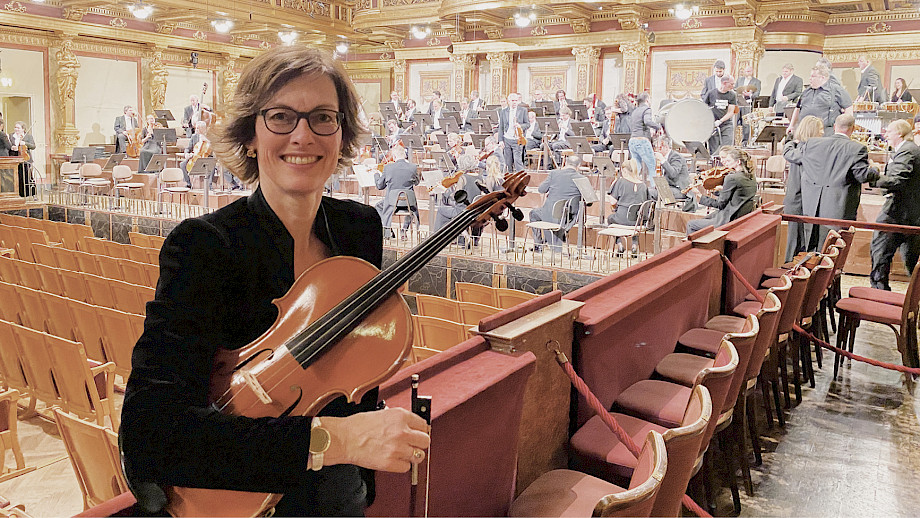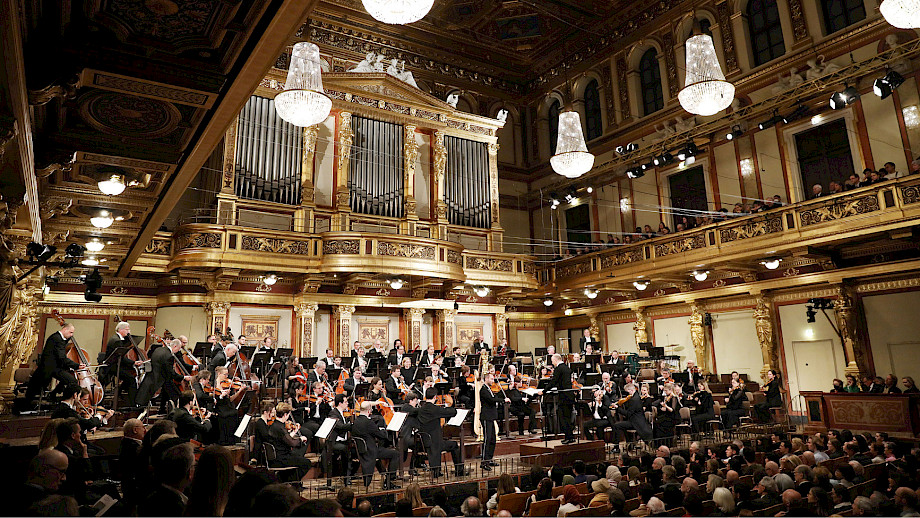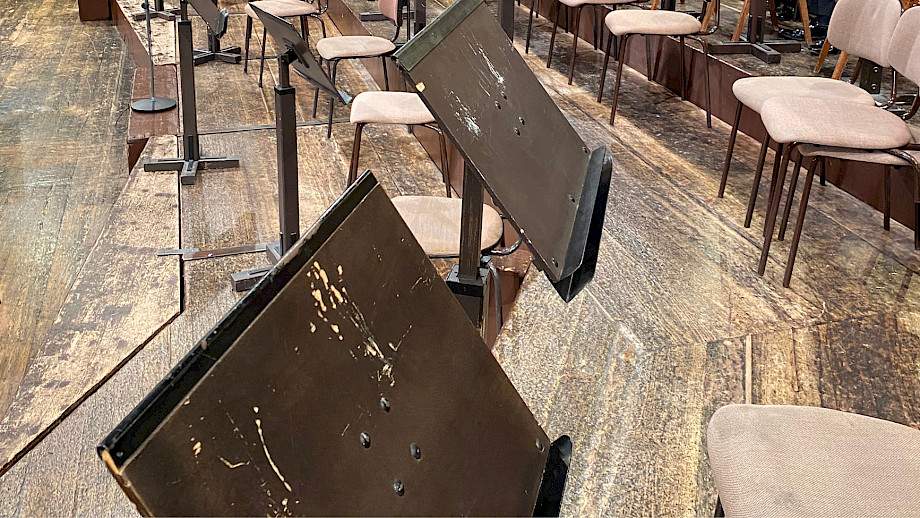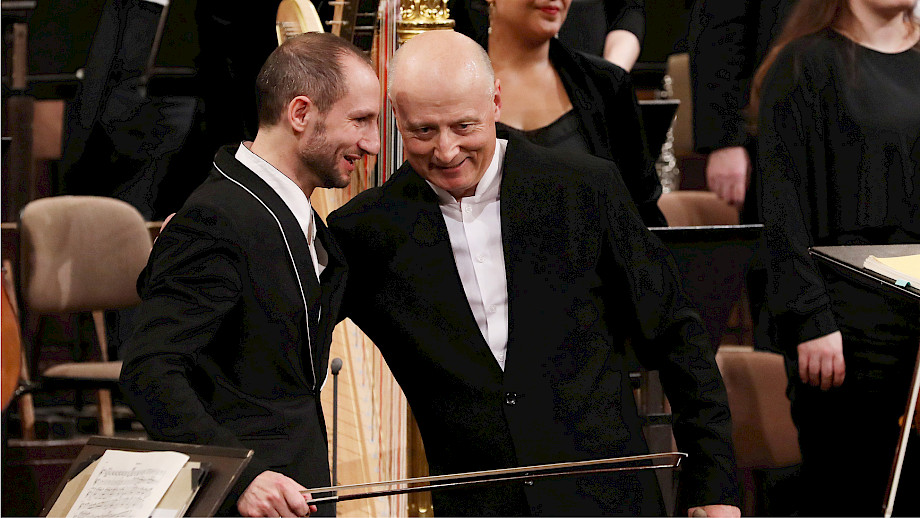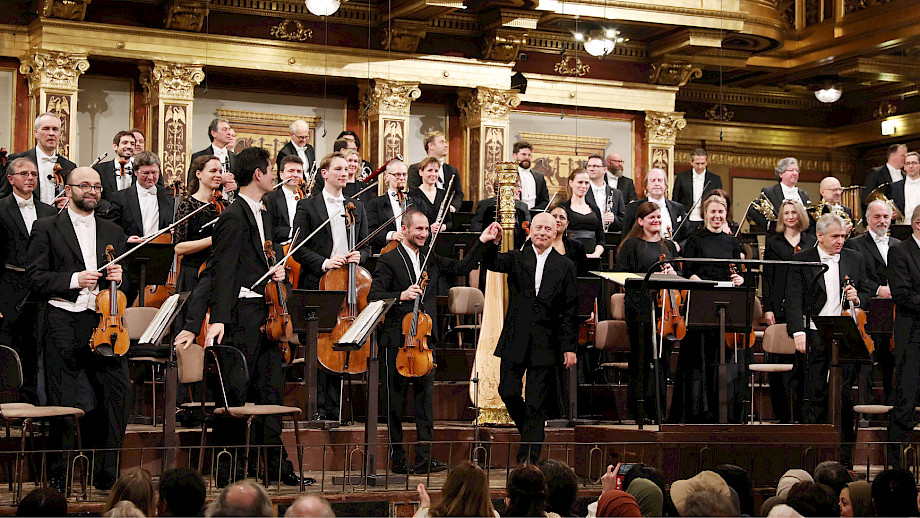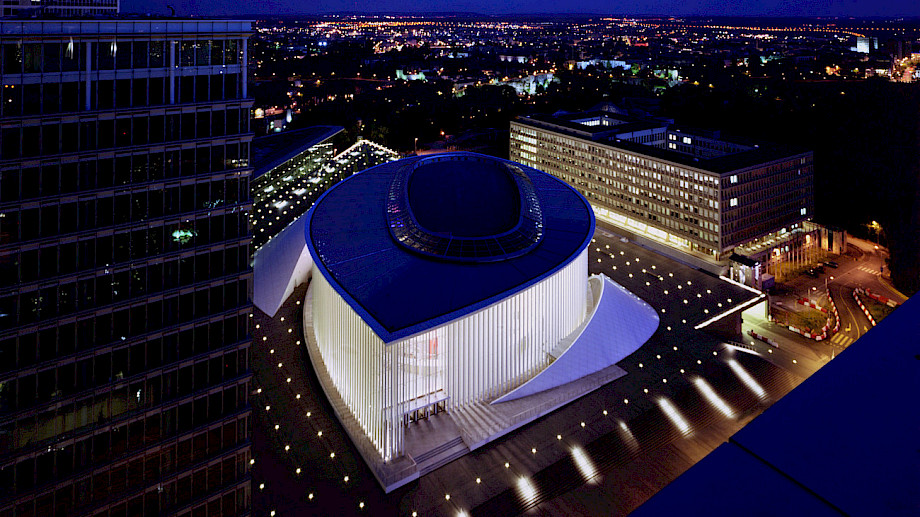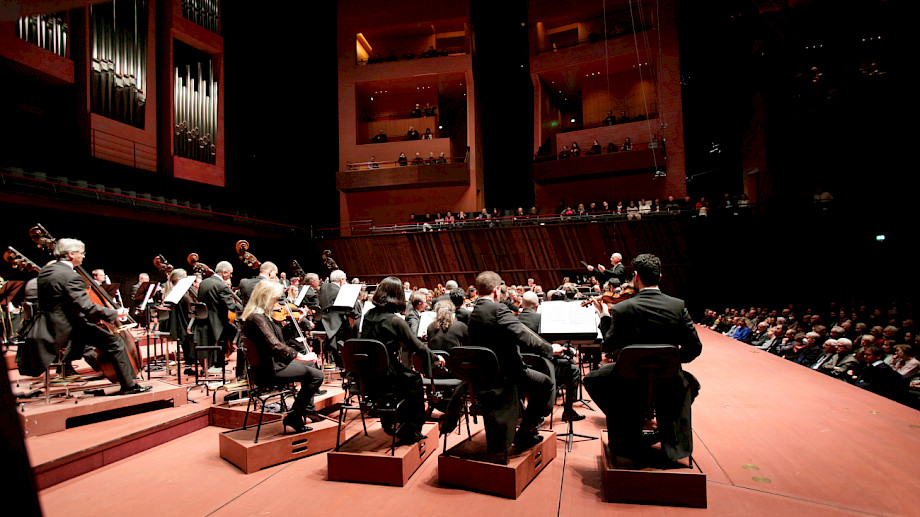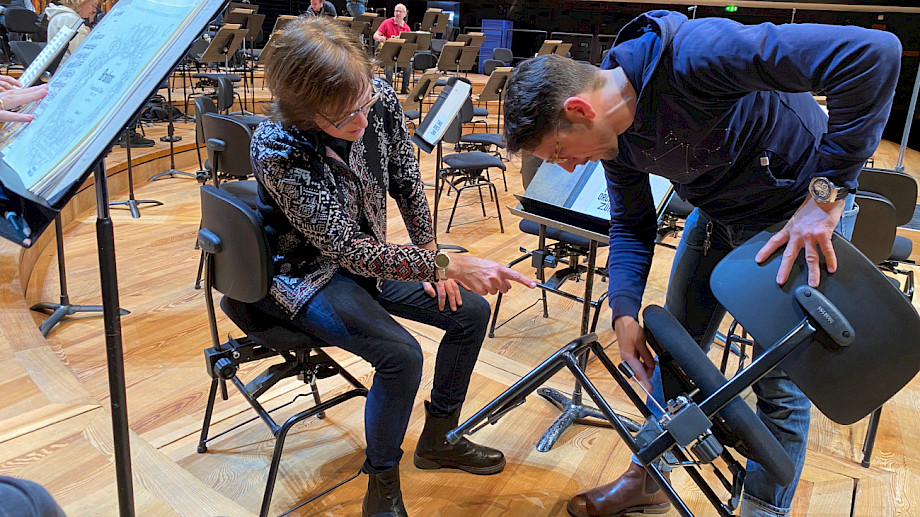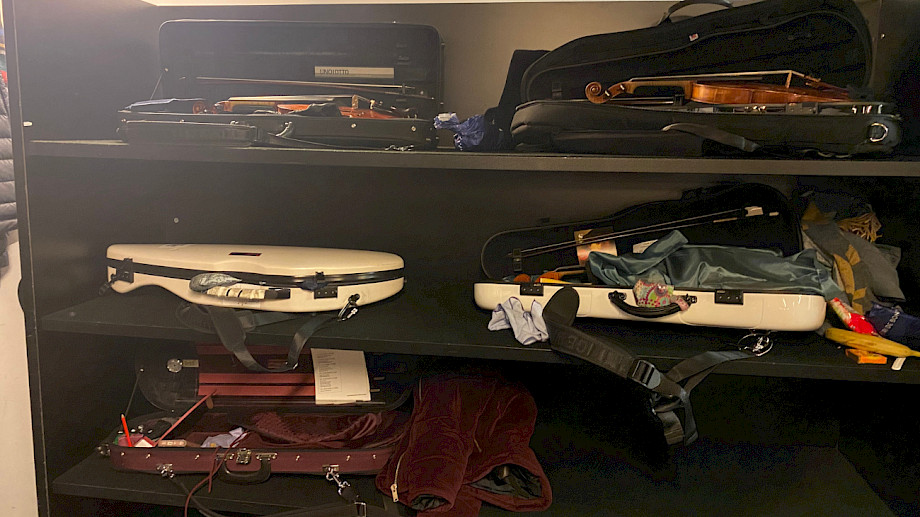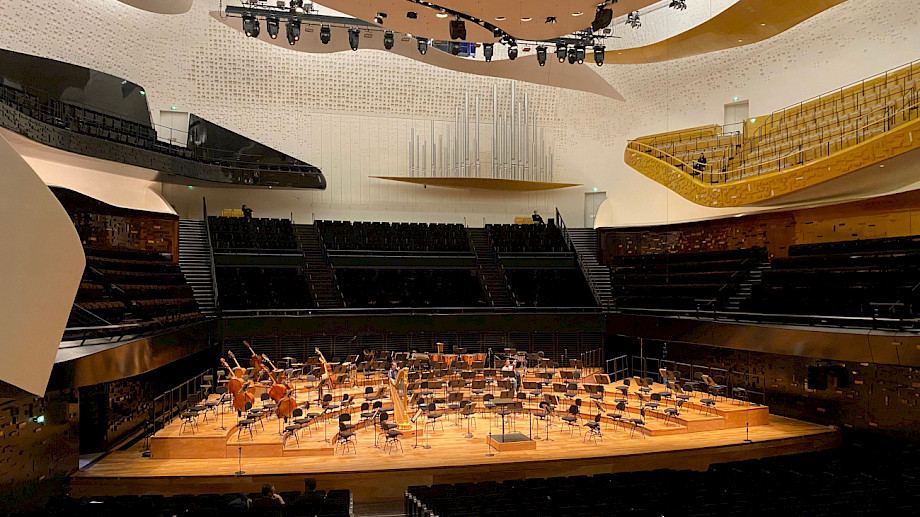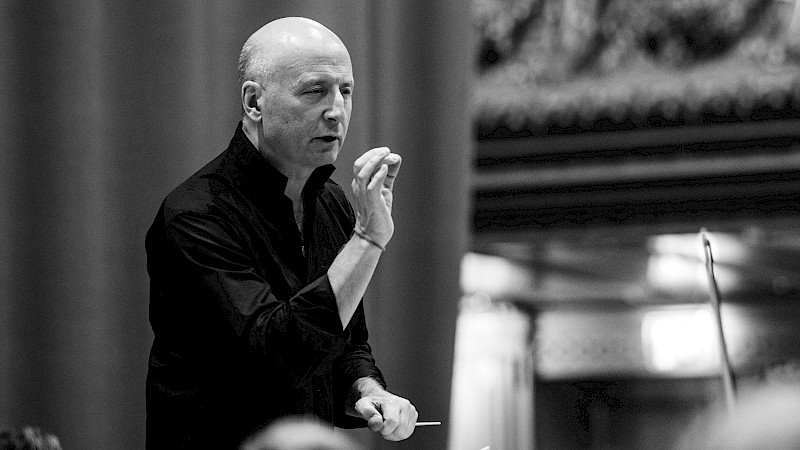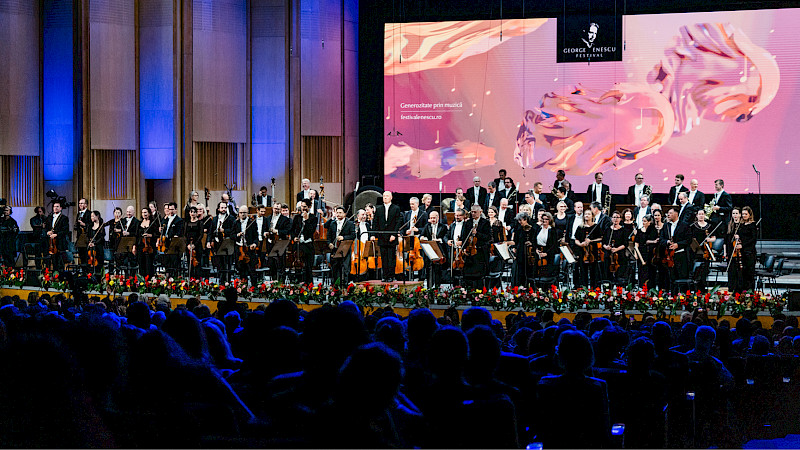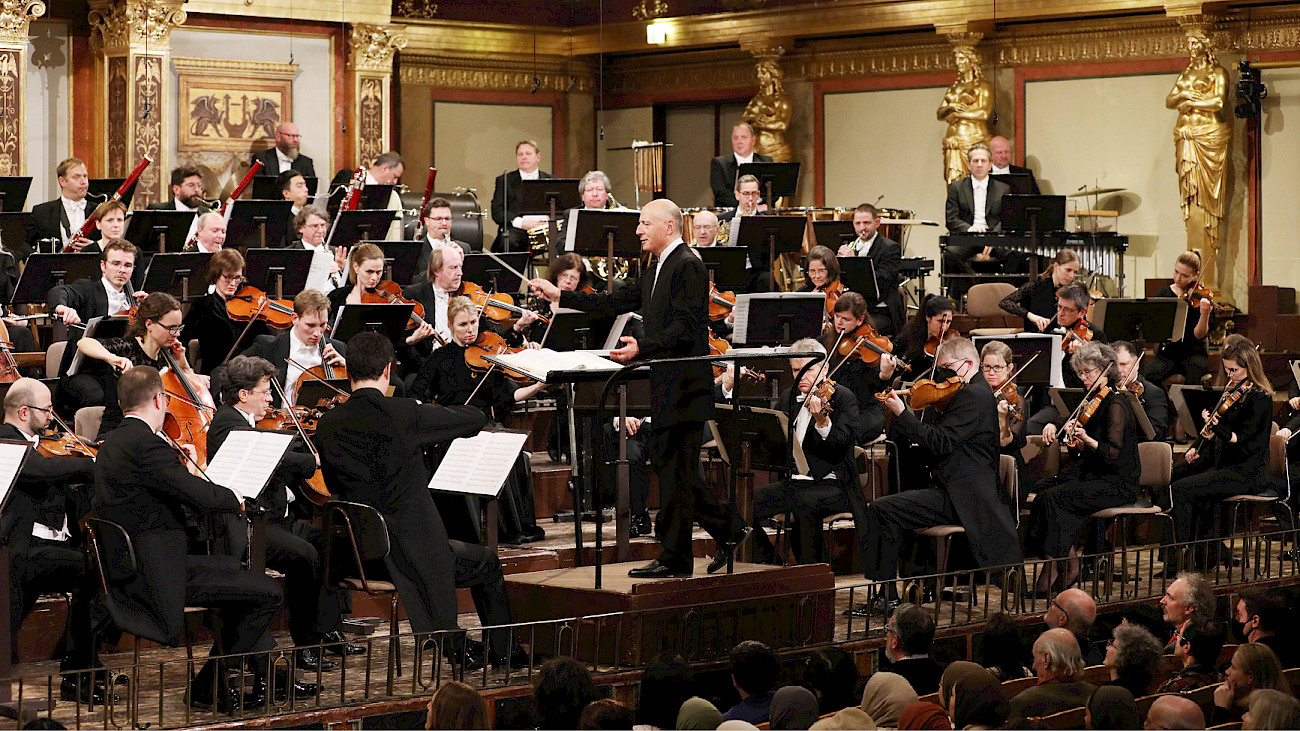
European tour: A theft and much applause
Vienna, Luxembourg, Paris, Basel: this was the tour of the Tonhalle-Orchester Zürich.
Vienna, 29 January 2023
Ursula Sarnthein, Viola: Security check at Zurich airport: I got caught – random check for explosives. Open the viola case, take the sample – close the case again – the obliging security employee is patient with me and I with him. His nice colleague asks me if we have a concert. I explain to her that we are the Tonhalle-Orchester Zürich on tour, then she tells me that her son was in our concert last Thursday with his school and thus heard the programme we are playing tonight in Vienna. He was very enthusiastic about his first concert in the Tonhalle.
Otherwise, it's business as usual: flight, bus, and the hotel at the Konzerthaus, where we have always stayed, like many other orchestras, for 25 years. It's been a few years since our last concert at the Musikverein – and since it is one of the great European temples of music, we are especially looking forward to the performance.
Michaela Braun, member of the Management: Our last visit to the Vienna Musikverein was in 2010, and in 2020 a newly visit had to be cancelled because of Corona. Now it has been made up for. The Golden Hall of the Musikverein is a symbol of beauty, magnificent acoustics, unique concert experiences, world-class conductors and soloists perform here, celebrating themselves and the music.
Anyone who is already awake on 1 January at 11.15 a.m. knows the hall, even if he or she has never been there before. Because that's when the Vienna Philharmonic's New Year's Concert takes place and is broadcast, with over 50 million viewers worldwide. Priceless advertising for Vienna as a tourist destination.
Our Music Director Paavo Järvi also says, when asked what the hall stands for: «Clearly for the New Year's Concert.» He had already seen it as a child and it always was an inspiring experience. Especially because in Estonia at that time one couldn't watch Finnish television at all. With an illegal antenna, it was still possible, and it was always the highlight at the beginning of the year. Paavo Järvi remembers how Willi Boskovsky always conducted from the first chair. And since he had always been a great fan of the Strauss family, it was then also the music that fascinated him. Glitter and glamour in an environment that was far from home.
Ursula Sarnthein, Viola: I didn't have many memories of the backstage area, but obviously nothing has changed, everything is marked by the traces of the glorious past! If backstage at the Elbphilharmonie in Hamburg you would think you were in the first class of a modern cruise ship, here it's more like the wooden class of an old overseas steamer ...
At the Musikverein there is a lot of hustle and bustle, the previous concert has just finished, there are still musicians running around with instrument cases who don't belong to us, and the audience is also still streaming in. Through the artists' entrance you enter a corridor through which carriages used to pass – today you walk past illuminated busts of Mahler, Brahms, Bruckner and Co. to the dressing rooms in the basement. In the narrow catacombs, the search for the right rooms and containers is more difficult than usual; fortunately there are helpful colleagues who have already found their way around.
«Rehearsal in concert dressing room» is written in the tour schedule, so we change and head towards the stage, hoping to be able to take another look at a few tricky passages in the Brahms and in the Berlioz before rehearsal begins. Our hopes are dashed – the previous concert ended 20 minutes late, and our three orchestra technicians have to move and set up the stage in record time, heave the timpani and percussion in the right place, place desks and chairs, and in the process manoeuvre around musicians standing haphazardly around. Matthias Lehmann kindly says: «It would be nice if no one was on stage yet». The Viennese technician is more direct: «You're in the way – as always!»
So I look for a safe place and look around: The hall seems higher than ours, narrower, and it seems more sacred, almost like a temple. The golden caryatids along the walls and the golden coffered ceiling are very elegant.
Ursula Sarnthein, Viola: The patina of the stage is really impressive. Generations of cellists have left their holes, but nothing has been sanded off – the countless small holes and dents have only been painted over. And the old wooden desks seem to have really fallen out of time – wobbly and bruised. The chairs have also seen better days ...
Perhaps this is still the floor on which Mahler conducted his symphonies? What is certain is that legendary conductors and orchestras have played here. That makes you a little reverent.
After the stage set-up is finished and we have adjusted ourselves on the unusually steep steps, we realise that we are sitting quite close to each other. The cellist next to me sometimes gets into my hair when playing pizzicato with his bow, and everyone else is also unusually close.
I sit at the third viola desk, directly in front of the oboe, in the middle of the stage, with the best view on Paavo Järvi and out into the hall. In the first quiet passage in the Berlioz, Harold alias Antoine Tamestit glides smoothly onto the stage and tells of his Italian journey with his clear, carrying viola sound. Our joy in playing and our love of music in the Brahms infects the audience – we thank them for their enthusiastic applause with the 1st Hungarian Dance by Brahms.
Michaela Braun, Management: Hectic and tension also have something good. You are thrown in at the deep end and have to work. And it worked, and how! The Viennese cheered and we thanked them. Our debut with Paavo Järvi here in Vienna was a success. Artistic Director Ilona Schmiel and Marc Barwisch, member of the Management, are working on the re-invitations. Regularity in Vienna is a goal. We are on course.
Translated with DeepL.com
Luxembourg, 31 January 2023
The concert in Luxembourg is over – and violist Ursula Sarnthein has a lot to report again:
Coffee, biscuits and «Käsekrainer»
Today I didn't manage to organise my meals at all – there's not much in the afternoon at the hotel, so I didn't eat enough and didn't buy anything until the rehearsal started at 6.45 pm.
Fortunately, right behind the entrance there is a table with coffee and biscuits to my rescue – just the thing after the only short, but wet and cold walk to the Philharmonie – two cups of coffee and about six biscuits later, my energy level is where it should be, but dinner is still not arranged. I wonder if there are enough biscuits?
I complain to Haika Lübcke – she thinks there should be stalls everywhere like in Vienna where you can buy «Käsekrainer» (sausages with cheese in them) at any time of the day or night. And then she takes pity on me and gives me half of her delicious sandwich. Thank you very much!
Houses in the hall
Backstage in Luxembourg we feel spoiled again there are many comfortable, modern dressing rooms for us and a short way to the stage.
The audience space is decorated in beautiful shades of red and blue – the stalls swing upwards in waves at the back, and there seem to be houses to the right and left: You feel a bit like you're in a theatre set, the audience looking down at us from their balconies. The house backdrop gives «Harold en Italie» even more theatre feeling.
There is so much space on the extremely large stage that Antoine Tamestit no longer «sneaks up» through the orchestra, but comfortably walks around us on the outside. In the concert, the abundance of space then spontaneously tempts him to actually move across the entire stage during the movement with the pilgrimage train, so that his sound comes sometimes from here and sometimes from there.
Travelling companions
We violas like the acoustics in Luxembourg very much: We can hear each other very well and produce a particularly compact group sound. In the Berlioz, not only the solo viola, but also the viola group of the orchestra has some well audible performances – sometimes we are the chorale-singing or Ave Maria-murmuring pilgrims, sometimes we lay a dancing carpet under the serenade of the «Montagnard» in the Abruzzi – important «travelling companions» for Harold!
Tonight we succeed particularly well, under the confident leadership of our two deputy solo violists Katja Fuchs and Sarina Zickgraf.
Translated with Deelp.com
Michaela Braun, Management: Today's journey from Vienna to Luxembourg went smoothly – tomorrow it could be different. Because what happens if the threatened general strike is called in France, with repercussions for public transport, from the railways to the ski lifts? We have to get to Paris, by train. Kindly, the long-distance tickets already booked can be used flexibly until 3 February. Unfortunate for us. We have to arrive on time with over 100 people, the Philharmonie is waiting for us.
Our team with Ambros Bösch, Susanne Arlt and Soraya dos Santos, who always have their finger on the pulse, has already come up with plan B. If nothing works, the bus will leave. If nothing works, the bus goes. Meticulous planning in advance is extremely important. Flexibility on tour is the measure of all things.
But first we are in Luxembourg. Our music director Paavo Järvi has been there dozens of times, he conducted the then RTL orchestra early on after starting his career in Scandinavia. Our soloist Antoine Tamestit has also been in this modern hall countless times. It was built in 2005, has 923 columns and three halls that can be played in parallel. With 400 concerts a year, 160 of which are for children and schools, it offers the only truly international programme between Saarbrücken and Metz. Many of the visitors therefore also come from nearby countries, if need be even with a specially organised shuttle. Everything in this house is therefore at least trilingual, with English even quadrilingual. This is quite an elaborate job for the marketing and communication team here.
But there are also many foreigners in the country itself who make active use of the concert hall. The European Court of Justice has its seat here, the secretariat of the European Parliament, and of course there are some financial service providers that operate here in Luxembourg.
Prices and capacity utilisation are also an issue here, as is the search for younger audiences. The state is now providing support for this. Since last September, there are free music lessons for all children for five years – although they don't have to start when they enter primary school, they can also start when they are 10 years old. The aim is to break down barriers and build interest in music. A concept that should also be discussed in Switzerland.
Translated with DeepL.com
Paris, 1 February 2023
From Luxembourg they went on to Paris. Violist Ursula Sarnthein tells us what it was like in Paris:
To be sure of arriving at the concert in Paris, we're taking the bus from Luxembourg to Paris instead of the TGV, for fear of a train strike. The bus driver has (besides his Rhenish accent) a direct way of expressing himself, which I know well as a native Rhinelander. "We are music!" he tells the customs officer at the French border when he wants to know who is on the bus. He's probably right!
Talking shop
I'm in the backstage area for a while before the dress rehearsal today, which, by the way, definitely gets the title of «best labyrinth of the tour» – you keep losing your bearings because everything looks the same. I take the opportunity to discuss orchestra chairs with Friedemann Dürrschnabel, the head of stage crew, as we will fortunately soon be able to purchase new ones ourselves. In Paris and Luxembourg on stage, we were able to test two models «under real conditions»! Apart from good adjustment possibilities for height, inclination and backrest, it is also important whether they can be stacked well in the confines behind our Zurich stage. Now we know better in which direction to go.
Really piano
«This is a great hall, it has great projection, so you can play really piano here,» is Paavo Järvi's recommendation at the beginning of the audition. We notice the difference to Luxembourg after the first notes –there is much more reverberation, and Antoine Tamestit's viola sound flies right away from us into Nouvel's black and gold hall. In Luxembourg he was more around us.
TGZ President Martin Vollenwyder, who is travelling with his wife and a few other like-minded people, has heard all the concerts: In Vienna you felt like you were sitting on the stage, he says, in Luxembourg the sound stayed more with the orchestra, and in Paris the sound was really everywhere and very precise. Every hall is very different, and you always experience new facets of the same programme, say the enthusiastic fellow travellers.
Here in Paris we have the liveliest audience so far – they are cheering even before the last note has faded away! We thank them with two encores.
A few of us celebrate the last evening of the tour with a glass of wine in the restaurant on the 6th floor of the Philharmonie; even the Eiffel Tower shines in the distance. At midnight it suddenly disappears – so saving electricity is also the order of the day in Paris.
Early risers
Not entirely voluntarily, we got up early on Thursday. The suitcases had to be handed in at 8.15 a.m., because about 100 musicians, 100 suitcases and various instruments – that doesn't fit into the TGV. Then there was this announcement: Everyone has to be at the platform entrance tomorrow at 12 o'clock sharp. The track is only known 20 minutes before departure, but it's quite simple, says Ambros Bösch: if the track number is a letter, the track is in Hall 1, and if it's a number, it's in Hall 2. Or was it the other way round?
Between breakfast and departure there is still time for something: Sleep, practice or speed sightseeing – I decide to practice today and ignore Paris.
Gare de Lyon
At the Gare de Lyon we also talk shop about the acoustics of the various halls. Florian Walser and Haika Lübcke agree – they found their own sound most beautiful in Paris. Isaac Duarte thinks that the Vienna Musikverein has a special, particularly beautiful sound. In the concert in Paris, we achieved the somnambulistic certainty that occurs especially on tours, after you have played the works several times in a row. If you know every «curve, you can spontaneously take it differently ...
So, how is it with the track now? At 11.55 we stand dutifully in Hall 2 (because SNCF has been displaying this info since we arrived) and wait for the number to be announced – first it shows a 10-minute delay. Then at 12.10: Hall 1!!!!
The train makes its way confidently to Hall 1, finds Platform H and its wagons, and we are already racing towards Basel, carrying macarons, tarte au citrons and other delicacies that were on sale at the Gare de Lyon.
Translated with DeepL.com
The Paris Philharmonie
Michaela Braun, Management: The Paris Philharmonie is located in the north of the city. If you want to go here, you take time to arrive. Until the opening in January 2015, there were some heated discussions about Jean Nouvel's building. He planned the Paris Philharmonie, it was our destination on 1 February, we were guests here for the second time. The first time we were there was with Paavo Järvi.
So not everything went so smoothly during the construction. The architect and the city met again in court. It was about money, a lot of money, and probably also about different opinions.
With 2400 seats, the house is currently the largest concert hall in Paris. It was built with the aim of also performing world music concerts in order to be attractive to different population groups. It was opened by our music director Paavo Järvi, then head of the Orchestre de Paris. Along with the President of the Republic, François Hollande, the soloists Hélène Grimaud and Lang Lang were also present. The house was not yet finished at the time, Paavo Järvi recounts. Parquet floors were unsealed and cranes were still standing around the house. Pierre Boulez dreamed of a «Cité de la musique», a centre with several concert halls, a museum, a media library and numerous educational facilities. That is exactly what has been created here, quite unique worldwide. «Aesthetically a masterpiece, outside and inside,» says Paavo Järvi.
The move to the north also brought with it a move of the audience, who were used to the more centrally located Salle Pleyel. It was not easy, because the clientele from the west of the city did not like to go to the north. Instead, over time, those from the east came. And they have remained enthusiastic. The difference is especially noticeable when you see the audience. Young and casual in dress code. The enthusiasm for the music is great – and during the applause after our concert you could also feel that Paavo Järvi had a home game here. It was warm and enthusiastic, even thunderous.
The Philharmonie is particularly committed to helping children from less well-off backgrounds. It runs a programme here with a fundraising target of 3 to 4 million euros a year. Due to the proximity to the other institutions in the Cité, there is also cross-thematic cooperation. For example, with the museum in the context of an exhibition on Fela Kuti at the moment or on Basquiat soundtracks from April.
Basel, 2 February 2023
Michaela Braun, Management: Arrived in Basel, the colleagues unloaded the truck with the instrument cases. Since everyone was so busy unloading, they didn't notice that valuable items had been stolen from the cab of the truck. AirPods, mobile phones, wallets – all gone. And Paavo Järvi had warned that the surroundings of the Paris Philharmonie were risky!
Then it's off to the last concert. Here, too, a freshly renovated hall awaits, Herzog & de Meuron have renovated the Basel Stadtcasino. Lots of purple in the aisles and modern elements in the outdoor spaces, combined with the classic shoebox inside. It is Paavo Järvi's debut in this hall and our last stop on this made-up European tour.
Brahms once again: a brilliant finale.




